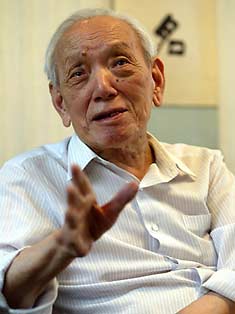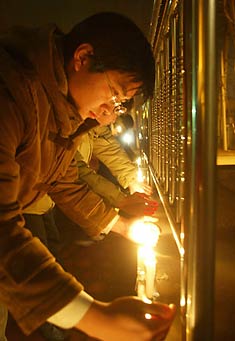UC Berkeley Press Release
Renowned mathematician Shiing-Shen Chern, who revitalized the study of geometry, has died at 93 in Tianjin, China
 Shiing-Shen Chern (China Daily photo) |
BERKELEY – Mathematician Shiing-Shen Chern, 93, one of the greatest geometers of the 20th century and a professor emeritus of mathematics at the University of California, Berkeley, died Dec. 3 at his home in the Chinese city of Tianjin. According to family members, Chern died of heart failure following a heart attack.
In the 1930s and '40s, Chern took the then-dormant field of differential geometry, which dealt with the mathematical description of geometric figures, and turned it into a vibrant area of study delving into the geometry of many dimensions and merging ultimately with the study of algebraic geometry and topology. Today, the fields on which he had the greatest impact -- global differential geometry and complex algebraic geometry -- are fundamental to many areas of mathematics and theoretical physics.
"The work he did is at the very foundation of one of the most important developments of modern theoretical physics -- gauge theory," said friend and colleague Hung-Hsi Wu, professor of mathematics at UC Berkeley. "With Chern classes and the Chern-Simons invariants, Chern is a household name in theoretical physics, especially in string theory."
"Anyone who wants to discuss differential geometry in the 20th century will have to mention two or three names, and Chern is one of them," Wu added. "By his stubborn trumpeting of the importance of geometry, people in the 1940s and '50s reluctantly acknowledged it -- it must be, because Chern said so."
Chern, who became a U.S. citizen in 1961, joined UC Berkeley's mathematics department in 1960 and retired in 1979, only to return as cofounder and first director of the Mathematical Sciences Research Institute (MSRI), the largest and most prominent math institute in the world. The building on the UC Berkeley campus housing the institute, which he directed from 1981 until 1984, will be named Chern Hall upon the completion of a new addition in late 2005.
"He was phenomenally important in geometry, a great benefactor to MSRI and a very kind man," said David Eisenbud, current director of MSRI, UC Berkeley professor of mathematics and current president of the American Mathematical Society. A major gift from Chern sparked MSRI's successful campaign to expand its building, and when Chern was honored earlier this year with Hong Kong's $1 million Shaw Prize for Mathematics, he gave MSRI a large additional gift from the proceeds.
MSRI was one of three mathematics institutes he founded during his 70-year career. In China, he established the Institute of Mathematics of the Academia Sinica, building it from the ground up in the 1940s and '50s as a training ground for a "glorious generation of Chinese mathematicians," Wu said. Chern also founded in 1984 the Nankai Institute of Mathematics at Nankai University in Tianjin, which built a home on the campus a short distance away so that Chern, by then in a wheelchair, could come to work every day. Still active in mathematics at the time of this death, Chern was honorary director of the institute.
A recipient of the 1983/84 Wolf Prize in mathematics, the equivalent of the Nobel Prize, he also received the U.S. National Medal of Science in 1975 and was elected in 1961 to the National Academy of Sciences.
 A student lights up candles on the campus of Nankai University, northern Chinese city of Tianjin, to mourn the death of renowned Chinese-American mathematician Shiing-Shen Chern Friday evening (China Daily photo) |
Shiing-Shen Chern (also spelled Chen Xingshen) was born in
Jiaxing, Zhejiang
Province, China, 50 miles southwest of Shanghai, on Oct. 26, 1911. He became interested in mathematics while in high school, and eventually majored in mathematics after enrolling in Nankai University at the age of 15. He pursued this study at Tsinghua University in Beijing and graduated in 1934 with a master's degree in mathematics. His interest in geometry growing, he took advantage of a Boxer Indemnity Fund fellowship to study geometry at the University of Hamburg under Professor Wilhelm Blaschke.
He obtained his doctorate from Hamburg in 1936, studied for a year at the Sorbonne in Paris, then accepted a position as professor of mathematics at Tsinghua University in 1937. He never reached Beijing, however -- the Sino-Japanese war broke out, diverting him to a temporary university set up in Changsha and then Kunming until 1943, when he left to study at the Institute for Advanced Study in Princeton, N.J.
He returned again in 1945 to China, where he set about creating a mathematics institute for the Academia Sinica, first in Shanghai and then in Nanking. As the Chinese civil war approached Nanking, his friends arranged for the Institute for Advanced Study to offer him a second position, which he accepted. This time, however, he stayed in the United States, first accepting a position at the University of Chicago, where he taught from 1949 until 1960, and then at UC Berkeley.
Throughout his career, he has been known for his generosity and kindness, noted his colleagues.
"He was a teacher of great charm," Wu said. His lectures impressed one student so much that, the day after he won the California lottery in 1995, he called the mathematics department to talk about endowing a chair in Chern's honor. That student, Bob Uomini, inaugurated the Shiing-Shen Chern Visiting Professorships at UC Berkeley in 1996 at a symposium honoring Chern.
"He also was a man of great leadership, notable for unique diplomatic skills that made him an outstanding administrator," Wu added.
Among his many honors were the German Humbolt Award in 1982, the Steele Prize of the American Mathematical Society in 1983, and the Chauvenet Prize of the Mathematical Association of America in 1970. He held six honorary degrees and was a fellow or member of numerous organizations around the world, including the Royal Society of London, the New York Academy of Sciences, the London Mathematical Society, the Indian Mathematical Society, and the American Academy of Arts and Sciences. The International Astronomical Union named an asteroid after him last month.
His wife, Shih-ning (Cheng) Chern, whom he married in Kunming in 1939, died four years ago. He is survived by son, Paul, of Needham, Mass., and daughter, May Chu, of Houston, Texas.
A memorial service has been scheduled at Nankai University on Dec. 12, and a memoriam is pending at UC Berkeley.

